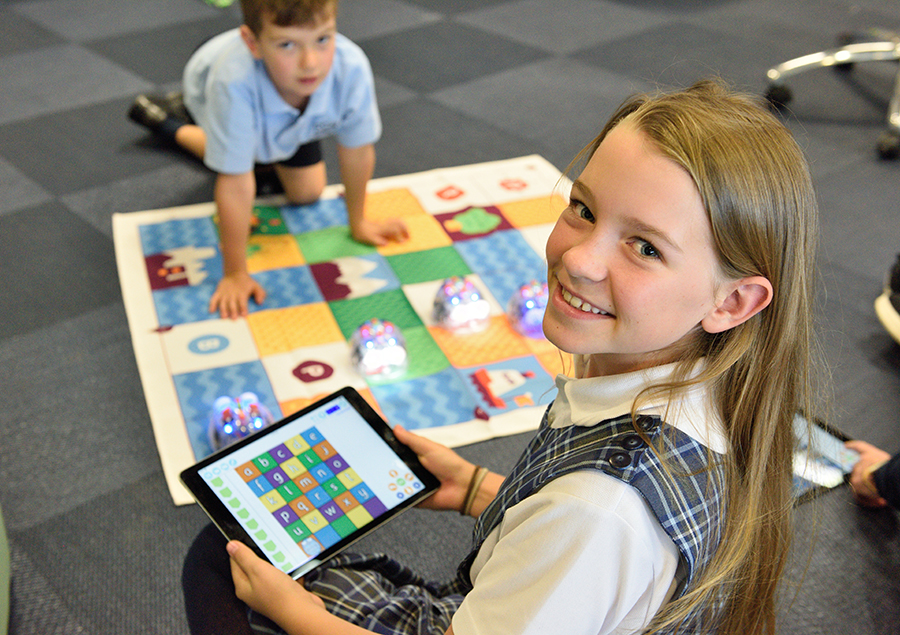We are constantly warned of the dangers of too much screen time for children, but with our lives ever more digital, how can we ensure they reap the benefits while avoiding the pitfalls? Sarah Blinco investigates
~
Screen time is blamed for a lot of things, from games addiction to the pressures of social media and cyber-bullying. But, technology is a fundamental part of modern life, and is only set to increase as artificial and voice intelligence infiltrates our human spaces at unprecedented speed. What are parents and schools to do, then?
Schools are responding in a number of ways, Saint Stephen’s College headmaster Dr Jamie Dorrington tells Get it.
“Our students are encouraged to use digital tools, particularly the tools in educational technology (EduTech) to add depth and breadth to their learning… Our society is playing catch-up, because rapidly emerging digital technologies are always well ahead of the protocols to guide their use…
Our graduates will be expected to employ technologies to simultaneously compete and collaborate with their peers in many different parts of the world.
This means that effective technology use must be supported by other skills, such as the capacity to work in teams and the ability to apply interdisciplinary knowledge.”
Making sense of screen time
Parents should make considerations when deciding on the type and amount of screen time to offer their kids. Dr Dorrington explains:
“There is clear evidence that phones can be a major distraction, not only from classroom activities, but also from playing, which is in itself an important learning activity. Only this morning, I listened to a report about young people’s excessive screen time. Data in the report came from parent surveys. It appears that parents are concerned about addiction to screens and the associated reduction in play time. This is something that sits squarely within the circle of influence of parents. If they use iPads as digital babysitters, they are sowing the seeds of this addiction.
“The other matter causing society concern is cyber bullying. Truth is, young people take their ques about how to treat other people from their home, and to a lesser extent, their school. If they hear their parents sniping at others, if they watch television shows that make celebrities of bullies, and if they attend a school with a culture of disrespect (and I don’t know any schools like this), then they will mirror this behaviour in social media. The phone just becomes the vehicle to communicate ill-informed, destructive, and unsolicited opinions that were already formed.”

Finding balance and setting boundaries
Information is power, and it’s imperative that we are all equipped with the knowledge needed to develop a healthy relationship with technology. Nicola O’Brien is a computing education specialist at the Australian Computing Academy. She spends much of her time ensuring helpful information is cutting through.
“We live in a world of technology, with so many services, entertainment, and ways to stay in touch online. We also share much of our personal information online. Children need to know how to use technology, and how to protect what matters to them. They should understand how these services and networks are created and what lies behind them too. Who is writing the algorithm that chooses your next song on Spotify? What does Siri really know about you? What’s wrong with using the same passwords everywhere? How do game developers know how to keep you playing?
“Allowing children to use technology thoughtfully, with curiosity, and allowing them to explore how technology works, sets them up with relevant skills for the rapidly changing world.
We don’t need to be fearful of our children growing up in a technology saturated world. We can work with them to think critically about how they use technology and the benefits for them in using it.
“Children learn so much from creating with technology. Whether it’s coding or tinkering with electronics and hardware. The sense of accomplishment they get from making something that’s never been made before is enormous. Children acquire problem solving skills and need resilience to create prototypes (which never quite work), iterate, and then have another go.”
How to tell what’s good for your kids or not? Nicola suggests asking yourself whether your children are consuming or creating? “There is a place for all uses of technology, it’s about being aware of what is engaged learning and creation compared with what is entertainment and having discussions with children around self-regulation and safety.”

Embracing enriching experiences
There are many free resources that make using technology fun and educational for kids and parents – make movies or podcasts, produce music, edit and create art. Coding of course, is an excellent option. Michael Nixon, CEO of EduKits International, explains: “There are two main benefits kids gain from engaging in coding activities: a fundamental understanding of how our digital world works, and how to navigate a computer. The former will be extremely important for future generations who need to have at least a basic handle on how the many technologies encountered in their homes, schools and workplaces operate.”
Michael may be a CEO, but he is just 16 years old. When he was 13, he identified a need to get his peers to understand coding and technology, and so designed the Amazing Annoyatron which teaches kids to code and is sold around the world. This savvy student clearly understands what’s ahead, and he’s keen to spread the word.
“The future, especially when it comes to technology, is extremely volatile and difficult to predict. Certainly, for Australia to remain competitive it must have young innovators working together to build on the many science and technology advancements to date. Giving children exposure to coding at school won’t create a generation of coders, but what it will do is ignite a curiosity for a higher proportion of school leavers to consider a career in information technology”.
Technology – is it friend or foe? Michael agrees with our other featured experts, reminding us that technology does not have a personality.
“It’s not the internet or tech that’s either saving lives or causing mental health issues. The way people – and especially teenagers – use technology is generally in a way that amplifies their personalities.”
Unsurprisingly the overarching advice is the same as for much in life: be responsible, use common sense, and consider the most positive approach to tech for you and your family.
Additional resources
If you’re not sure where to start, you can take a look at the Australian Computing Academy resources (aca.edu.au/resources) with your child, and encourage their school to get on board too. Other great learn to code activities can be found at Scratch (scratch.mit.edu), Make Code (makecode.org) and Grok Learning (groklearning.com).





